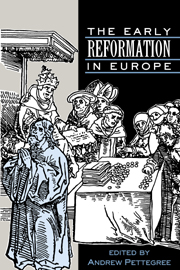6 - France
Published online by Cambridge University Press: 06 January 2010
Summary
The questions posed by the Reformation in France are different from those involved in countries that experienced a state Reformation. With the exception of Béam (Navarre), which cannot be considered as fully a part of France during the sixteenth century, Protestants were only rarely in a position to try and impose their religion and way of life upon an uncommitted or hostile population. For the most part their periods of domination in a particular city or region, dependent on the protection of the powerful and the fortunes of religious war, were too short to allow a sustained effort at the ‘Protestantisation’ of the populace. Instead we are dealing with the growth, at first slow then spectacular, of an initially clandestine and unorganised movement, all of whose adherents, however mixed their motives, were Huguenots because they wanted to be, in conscious opposition to the existing church and implicitly, whether they liked it or not, the state. In so doing they developed not only a new ecclesiastical organisation, eventually channelled by Calvinism, but also new political theories and an original morality and mentality. To this extent a recognisable French Protestantism was being forged during the period considered here, from the 1520s to the 1560s, although it was only from about 1555 onwards that French Protestantism would find a secure base and organised church structure.
Equally important to the fate of the first tentative reforming initiatives of the first generation was the fact that French Catholicism was neither static nor monolithic.
- Type
- Chapter
- Information
- The Early Reformation in Europe , pp. 120 - 141Publisher: Cambridge University PressPrint publication year: 1992

